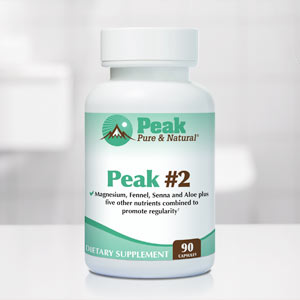Get Easy Health Digest™ in your inbox and don’t miss a thing when you subscribe today. Plus, get the free bonus report, Mother Nature’s Tips, Tricks and Remedies for Cholesterol, Blood Pressure & Blood Sugar as my way of saying welcome to the community!
If your bowels are sluggish, so are you

Is there a connection between slow moving bowels and your energy levels? Think about it… if they’re moving at a snail’s pace — are you too?
Lack of energy and a general sluggishness is not fun and can really decrease your quality of life. If you’re not able to do the basic things that bring you joy and make you happy, what’s the point?
For most of us, being tired or experiencing low energy is an intermittent problem… something we experience from time to time; when we get some sleep we bounce back. But for the millions suffering Multiple Sclerosis (MS) quality of life is greatly diminished because of chronic, persistent fatigue.
The hot topic among many presenters at the Consortium of Multiple Sclerosis Centers (CMSC) Annual Meeting recently was the role of bowel health and MS fatigue. Emma Matthews of the Northampton General Hospital in England presented findings that suggested, “sluggish bowels may be contributing to fatigue among multiple sclerosis (MS) patients.”
Even though the researchers were focused on MS patients, it’s possible that any condition that weakens nerves and muscle could promote constipation and lead to fatigue. And even among those of us considered healthy, constipation can have far reaching effects on both your health and energy levels.
But there are several ways to avoid or reduce constipation so you can feel better and more energized.
The connection
MS patients experience constipation as a result of closely linked nerve transmissions. In many cases it is so severe that there are 10 days between bowel movements. This is unhealthy because bad bacteria have a chance to move back into the bloodstream and cause immune challenges and fatigue. Bowel motility is essential in reducing fatigue.
You may not have MS, but if you have slow-moving bowels and don’t do anything to improve their health and the speed at which waste passes through your body, it’s only a matter of time before constipation is severe enough to zap your energy.
For the study, researchers asked 50 MS patients to complete a questionnaire and then worked with patients in a focus group. To gather more precise data they utilized several scales, including: 1) the Neurogenic Bowel Dysfunction (NBD) scale which scores constipation and its impact on quality of life; 2) the Fatigue Severity Scale (FSS), which is a short questionnaire containing statements that rate the severity of your fatigue symptoms and evaluates the impact of fatigue on you; and 3) the Epworth Sleepiness Scale (ESS), which determines levels of daytime sleepiness.
The researchers found that 23 percent of participants reported having a “severe” bowel dysfunction. In addition, of the 47 percent of respondents who scored high on the sleepiness scale (more than 75 percent of the total possible points)), almost all had scores on the fatigue scale (FSS) showing they “agreed” their fatigue had a huge impact.
In concluding their findings, Matthews told MedPage Today that, “Good bowel management for people with MS will hopefully help with their MS fatigue symptoms and make their quality of life better.”
Causes of constipation
Several things can contribute to the severity of constipation in anyone, and would likely have an even worse impact on someone suffering with MS or a similar disease or condition. In my next article I want to talk about specific solutions in detail, but sometimes just knowing the cause can begin to lead you towards the remedy…
Poor Diet – In many cases constipation is caused by poor diet. This includes diuretic beverages like sugary drinks (soda, iced tea and fruit juice), alcohol, tea and coffee. These promote fluid loss through increased sweat and urination. When the bowels become dry from lack of water in the intestines, bowels become dry, hard, sluggish… and this leads to constipation.
A low-fiber diet also directly contributes to constipation. Fiber from vegetables, whole grains and fruit is necessary to properly form stools, creating bulk and helping transport matter through the intestines. A diet low in fiber does not provide that bulk and can cause stools to become more compact, hard and immobile over time. Diarrhea can also be a result of severe constipation.
Sedentary Lifestyle – One of the best ways to feel good physically and mentally is to get up and move. And exercise of various kinds also helps keep the bowels moving. This is tough, I know, because MS patients are often in pain and experience chronic fatigue and this prevents them or saps their motivation to get up and move their body. But it’s necessary if we are trying to overcome constipation and also pain. If you have MS and sit or sleep most of the day, please get up and move.
Psychological Stress – Emotional stress causes the body to contract. Muscles tighten chemicals in the body change, breathing becomes belabored and all of this affects bowel function. If you have MS and are stressed often this may be a cause of sluggish bowels.
Medications – Many prescription and over the counter (OTC) drugs and medications also contribute to constipation. Dr. Michael Cutler says that medications “can slow intestinal smooth muscle peristalsis (contractions). Problematic substances include narcotic analgesics, antacids, calcium channel blockers, Parkinson’s disease medications, antispasmodics, iron supplementation, some antidepressants, diuretics and anti-seizure medications.” You can read his full article here.
Hopefully some of these causes are things you can begin to change if you believe constipation is robbing you of your energy or health. Be sure to read my post next to discover helpful solutions to getting your energy back.
Editor’s note: Did you know that when you take your body from acid to alkaline you can boost your energy, lose weight, soothe digestion, avoid illness and achieve wellness? Click here to discover The Alkaline Secret to Ultimate Vitality and revive your life today!













